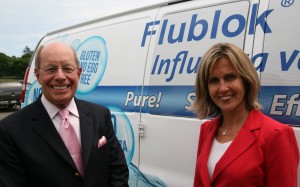Protein Sciences Corp., a Connecticut-based biopharmaceutical company that uses modern cell culture technology to manufacture its Flublok influenza vaccine at its plant in Rockland County, has reached an agreement with a Japanese company to produce Flublok in bulk in Japan for the U.S. market.
On the domestic front, Protein Sciences officials have protested to federal officials the company”™s exclusion from contract bidding to provide flu vaccine to military veterans through the Department of Veterans Affairs and Department of Defense. That loss of prospective government business has kept the company from expanding Flublok production at its federally supported Pearl River facility, according to Daniel D. Adams, Protein Sciences executive chairman.
In Japan, the company”™s recently announced arrangement with Unigen Inc., if approved by the U.S. Food and Drug Administration, could add up to 25 million doses of Flublok each year to America”™s flu vaccine supply. Flublok is approved in the U.S. for use by adults age 18 and older.
UMN Pharma Inc., a Japanese joint-venture partner in Unigen, already is licensed by Protein Sciences to manufacture Flublok for an east and southeast South Asia market that includes Japan, China, Korea, Hong Kong, Taiwan and Singapore.
Unlike traditional flu vaccines, Flublok is not made using chicken eggs or infectious influenza viruses. The company”™s technology uses recombinant DNA and a modified virus that infects insects to produce large quantities of hemagglutinin protein, the active ingredient in flu vaccines.
Last November, Protein Sciences officials announced a “landmark moment” when Flublok was approved by regulators in Mexico for use by adults, making it the first recombinant flu vaccine available in that country. Laboratorios Liomont, S.A. de C.V., a Mexican pharmaceutical company, is licensed to market Flublok there. Mexican officials also approved a 1-year shelf life for the product, compared with six months in the U.S.
Headquartered in Meriden, Conn., Protein Sciences last year was licensed by the FDA to commercially manufacture Flublok at its 83,000-square-foot facility on the former Pfizer Inc. campus in Pearl River in addition to its Meriden production. Most of the developed portion of the 550-acre campus on Middletown Road ”“ including the building where Protein Sciences has a five-year lease that expires in 2018, with a five-year renewal option ”“ was acquired by Los Angeles-based Industrial Realty Group LLC in a $39.45 million deal last November.
Its recombinant technology and the more rapid production that allows over egg-based vaccines has brought Protein Sciences approximately $150 million in grants from the federal Biomedical Advanced Research and Development Authority, a 10-year-old agency that works with private industry using advanced technologies to build up the nation”™s vaccine inventory in the event of a flu pandemic. BARDA has set for Protein Sciences a production capacity goal of 50 million doses in a 6-month period.
Adams said the company, the only flu vaccine manufacturer in the U.S., can produce up to 5 million Flublok doses at its Pearl River plant. The company produced 1.2 million doses there in 2015. In 2016, Protein Sciences aims to crack the country”™s retail market for flu vaccines and could claim a 25 percent market share within 5Â to 10 years, Adams said.
But Protein Sciences has been excluded from bidding on federal military contracts worth “tens of millions of dollars” with the Department of Defense and Department of Veterans Affairs by overly restrictive specifications, Adams said. Without that government market, “It”™s difficult for us to expand in Pearl River,” he said.
Adams about three months ago wrote to attorneys at the Government Accountability Office in Washington, DC, to protest what he called a “noncompetitive” bid solicitation from Veterans Affairs for a high-dose influenza vaccine for veterans 65 and older for the 2016-17 influenza season. Although Flublok is approved for people in that age range, only a competitor”™s comparable product, Fluzone High Dose, was considered for that bid item, Adams said in his letter. Fluzone is made by the French pharmaceutical giant Sanofi Pasteur.
Clinical studies have demonstrated comparable degrees of protection for seniors using either high-dose vaccine, Adams noted. Unlike its rival brand, Flublok is not limited to people 65 and older and so can be used “in the entire VA population,” he said.
Protein Sciences officials also objected to the veterans agency”™s exclusion of vaccines with less than an 8-month shelf life from consideration as “arbitrary and noncompetitive.” Flublok”™s 6-month shelf life ”“ expected to be raised to 9 months this year by the U.S. Food and Drug Administration ”“ “is more than adequate to cover the Northern Hemisphere influenza season,” Adams wrote.
The Pearl River vaccine maker also objected to a requirement for most solicited bid items that the vaccines be administered in single-dose syringes. Unlike other preservative-free vaccines, Flublok comes in single-dose vials. Adams said there is no legitimate reason for requiring syringes “other than to exclude Protein Sciences from the bidding process.”
“Flublok is the only flu vaccine made in America by an American company,” he told GAO officials. “Our veterans deserve the chance to receive a better product and one made in America by an American-owned company.”
Adams told the Business Journal the VA paid a higher price for Sanofi Pasteur”™s Fluzone High Dose than the price Protein Sciences offered for Flublok. “We suspect that Sanofi wrote the specifications to exclude us so that they could bid higher than us,” he said.
GAO officials rejected the company”™s protest. “Despite our claims of fraud, anti-Americanism, deception, misrepresentation etc., they said we filed too late,” Adams said. “We questioned them as to what their purpose was if they didn”™t address such issues but got no response.”
“We”™re expecting to sell a lot of vaccine in Japan,” Adams said. “But we”™ve got some very powerful competition in the U.S” ”“ foreign manufacturers ”“ “who keep working against us. We have a better product than anything else on the market and that scares them. They kill it off because they don”™t want to see another product on the market.”
“It is frustrating and it does damage our business,” he said.




















